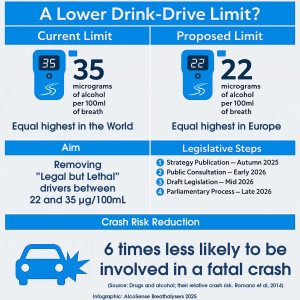Drink-Drive Limit Reduction “Overdue but Welcome”

The government's long-awaited proposal to lower the drink-drive limit in England and Wales is a welcome and overdue move, according to Hunter Abbott, Managing Director of AlcoSense Laboratories and member of the Parliamentary Advisory Council for Transport Safety (PACTS). Labour plans to reduce the legal limit from 80mg of alcohol per 100ml of blood (0.80? BAC) to 50mg (0.50?
BAC), bringing England and Wales into line with Scotland and much of Europe. Writing on Road Safety GB Abbott says campaigners have warned for years that the English and Welsh limit is dangerously out of step with modern science and international best practice. "At 80mg, a driver is around 13 times more likely to be involved in a fatal crash than someone sober.
These are the 'legal but lethal' drivers we share our roads with," he explained. Even at the proposed new limit, drivers are still five times more likely to be involved in a fatal crash than when sober. Abbott argues that England and Wales should ultimately aim for a 20mg limit, as adopted by countries such as Sweden, Norway, Poland and - imminently - Spain.
"A 20mg threshold strikes the right balance," he says. "It is below the point of intoxication, prevents impairment, and aligns with international best practice." Opponents often point to Scotland, claiming that its 2014 change had no measurable impact on casualties. But a 2024 AlcoSense survey, marking the tenth anniversary of the law, found that 79% of Scots believe it has made roads safer, 77% want England and Wales to follow suit and 40% report drinking less overall.
"The data shows that lowering the limit reshapes behaviour," Abbott explains. "Fewer people drink when they know they will drive and millions avoid risky decisions altogether." The latest government figures underline the urgency of reform. In 2023, 260 people were killed in drink-drive crashes, with 6,310 casualties in total.
Progress has stalled: fatalities have hovered above 200 for nearly a decade. Abbott insists the limit change must be paired with further measures, including more post-crash testing (currently just 37% of drivers are breathalysed, down from 51% a decade ago), random roadside checks (standard across Europe, but not in the UK) and stronger public education. "At AlcoSense, we focus on helping people make safe decisions the 'morning after', when alcohol can remain in the system long after drinking.
Our mission is to prevent dangerous guesswork, not to help people drink up to a limit," adds Abbott. "The UK once led the way on road safety with the first roadside breath test in 1967. We are now lagging behind.
In 2025, there is no excuse for laws that allow impaired drivers on our roads.
Reducing the limit will save lives - and that, surely, is reason enough."
